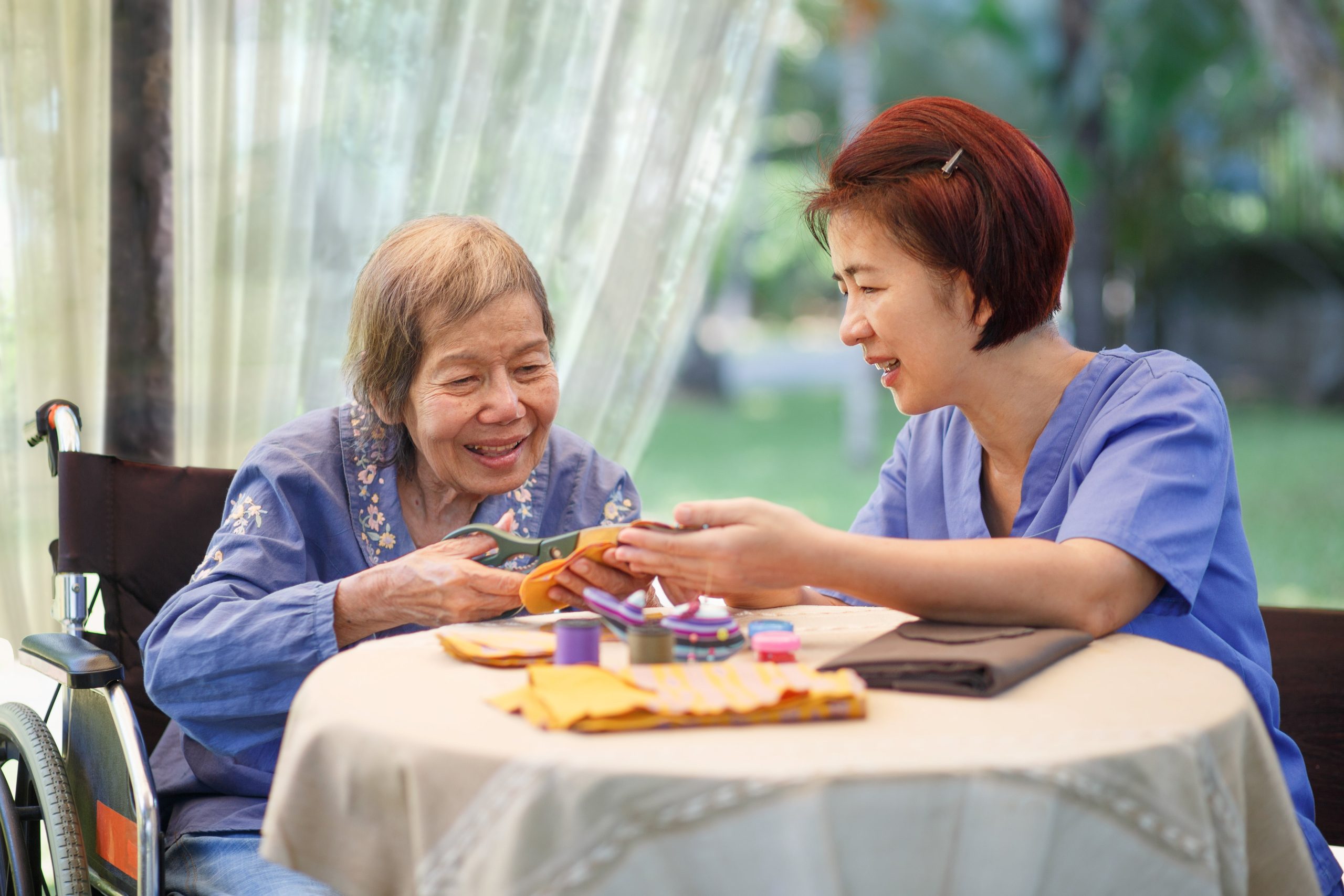Whether because of age or disability, California adults who require assistance with day-to-day activities like bathing, getting dressed, or transportation to stores and appointments reported their health as worse overall and experience higher rates of serious psychological distress, according to a new study by the UCLA Center for Health Policy Research. Serious psychological distress includes mental health problems severe enough to cause moderate to serious impairment in social, occupational or school functioning, and to require treatment.
Nearly half (46{e60f258f32f4d0090826105a8a8e4487cca35cebb3251bd7e4de0ff6f7e40497}) of adults who need long-term services and supports (LTSS) reported their health as “fair” or “poor,” compared with 15{e60f258f32f4d0090826105a8a8e4487cca35cebb3251bd7e4de0ff6f7e40497} of adults overall in California. The study also showed that adults who have unmet LTSS needs experienced serious psychological distress at a proportion 50{e60f258f32f4d0090826105a8a8e4487cca35cebb3251bd7e4de0ff6f7e40497} higher than adults who did not report unmet needs (27{e60f258f32f4d0090826105a8a8e4487cca35cebb3251bd7e4de0ff6f7e40497} vs. 18{e60f258f32f4d0090826105a8a8e4487cca35cebb3251bd7e4de0ff6f7e40497}). Unmet needs could include not having access to services or that the services that were provided did not encompass everything a person needed.
Other examples of long-term services and supports include assistance with tasks like housekeeping, nutrition programs, and case management services. LTSS care is most typically unpaid care provided by family members, friends, and neighbors. While most people are willing to provide assistance, it can be a struggle for caregivers who may experience physical, emotional, and financial strain over time. Furthermore, across the United States, nearly 25{e60f258f32f4d0090826105a8a8e4487cca35cebb3251bd7e4de0ff6f7e40497} of adults with disabilities live alone.
“What we learned demonstrates that California must improve how it provides resources for adults who need these types of assistance to live independent and healthy lives,” said Kathryn Kietzman, director of the Health Equity Program at the UCLA Center for Health Policy Research (CHPR) and the study’s lead author.
Using data from the 2019–2020 California Long-Term Services and Supports study, a follow-on survey of the 2019–2020 California Health Interview Survey (CHIS), the new report offers one of the first looks at the relationship between unmet needs for LTSS, access to health care, and health and well-being outcomes among California adults of all ages who have LTSS needs.
The report notes that there are an estimated 4.1 million adults in California with LTSS needs. Reasons for needing LTSS can be related to disability or aging with chronic conditions such as arthritis, heart disease, diabetes, depression, or anxiety.
Figuring out how to provide needed resources for these individuals will only become more important as California’s population ages, the report states. The California Department of Aging estimates the state’s population over age 60 will increase by 166{e60f258f32f4d0090826105a8a8e4487cca35cebb3251bd7e4de0ff6f7e40497} from 2010 to 2060. The population over age 85 will increase by 489{e60f258f32f4d0090826105a8a8e4487cca35cebb3251bd7e4de0ff6f7e40497} during the same period.
Other key findings in the report:
- One in five (21{e60f258f32f4d0090826105a8a8e4487cca35cebb3251bd7e4de0ff6f7e40497}) adults who need long-term services and supports said they experienced serious psychological distress in the previous month compared with only 6{e60f258f32f4d0090826105a8a8e4487cca35cebb3251bd7e4de0ff6f7e40497} of California adults overall.
- A larger proportion of Asian (37{e60f258f32f4d0090826105a8a8e4487cca35cebb3251bd7e4de0ff6f7e40497}), those identifying as “other,” which included American Indian or Alaska Native; Native Hawaiian or Pacific Islander; or two or more races (30{e60f258f32f4d0090826105a8a8e4487cca35cebb3251bd7e4de0ff6f7e40497}), and Latinx (22{e60f258f32f4d0090826105a8a8e4487cca35cebb3251bd7e4de0ff6f7e40497}) adults with LTSS needs reported serious psychological distress compared to white (17{e60f258f32f4d0090826105a8a8e4487cca35cebb3251bd7e4de0ff6f7e40497}) and Black or African American (16{e60f258f32f4d0090826105a8a8e4487cca35cebb3251bd7e4de0ff6f7e40497}) adults.
- For unemployed adults, those with LTSS needs (38{e60f258f32f4d0090826105a8a8e4487cca35cebb3251bd7e4de0ff6f7e40497}) were nearly three times as likely as those without LTSS needs (14{e60f258f32f4d0090826105a8a8e4487cca35cebb3251bd7e4de0ff6f7e40497}) to experience serious psychological distress.
- Among those with jobs, 29{e60f258f32f4d0090826105a8a8e4487cca35cebb3251bd7e4de0ff6f7e40497} of adults with LTSS needs reported experiencing serious psychological distress compared with 6{e60f258f32f4d0090826105a8a8e4487cca35cebb3251bd7e4de0ff6f7e40497} of adults without LTSS needs. Balancing work and managing chronic health conditions and/or disabilities may cause additional physical or interpersonal barriers that contribute to distress, Kietzman said.
“The differences among races and ethnicities may reflect gaps in the availability of services and programs that are culturally sensitive and available in different languages,” said co-author Lei Chen, postdoctoral scholar at UC San Francisco Philip R. Lee Institute for Health Policy Studies, and project policy analyst at the UCLA Center for Health Policy Research.
Looking at how health insurance affects adults with LTSS needs, 38{e60f258f32f4d0090826105a8a8e4487cca35cebb3251bd7e4de0ff6f7e40497} of those without insurance said they experienced serious psychological distress. For those insured by Medi-Cal, or eligible for both Medi-Cal and Medicare, it was 30{e60f258f32f4d0090826105a8a8e4487cca35cebb3251bd7e4de0ff6f7e40497}, those with private insurance 23{e60f258f32f4d0090826105a8a8e4487cca35cebb3251bd7e4de0ff6f7e40497}, and those with only Medicare-related public insurance 9{e60f258f32f4d0090826105a8a8e4487cca35cebb3251bd7e4de0ff6f7e40497}.
More than one-third of adults (36{e60f258f32f4d0090826105a8a8e4487cca35cebb3251bd7e4de0ff6f7e40497}) who did not have a regular source of medical care reported experiencing serious psychological distress, which is higher than those who used a community health center (21{e60f258f32f4d0090826105a8a8e4487cca35cebb3251bd7e4de0ff6f7e40497}), or a privately insured source of care (18{e60f258f32f4d0090826105a8a8e4487cca35cebb3251bd7e4de0ff6f7e40497}).
“Understanding and responding to the myriad needs of a diverse population of older adults and adults with disabilities in California requires careful attention to data,” said Kietzman, who is also an associate researcher in the community health sciences department at the UCLA Fielding School of Public Health. “The differences within the LTSS population exhibited in our study are a stark reminder that adults who need long-term services and supports are not a monolithic group.”
The report recommends improving access to LTSS for eligible populations through educating the public on existing programs, improving care coordination and better connecting LTSS recipients to behavioral health care.
The Aging and Disability Resource Connection (ARDC) and CalAIM are two initiatives that support care efforts. ARDC uses a “No Wrong Door System,” which is designed to prevent users from getting passed among different offices in search of the “correct” option, to coordinate access to a range of culturally and linguistically appropriate services.
CalAIM, which is for individuals who are eligible for Medi-Cal, works to eliminate existing silos among different types of service providers, which can make accessing care inefficient and difficult.
The study’s findings can help policymakers develop programs that improve figuring out who needs LTSS, what type of assistance they need, access to appropriate care and the distribution of resources to better address their needs.
“As a matter of equity, we should never accept disparities as the norm,” Kietzman said.





